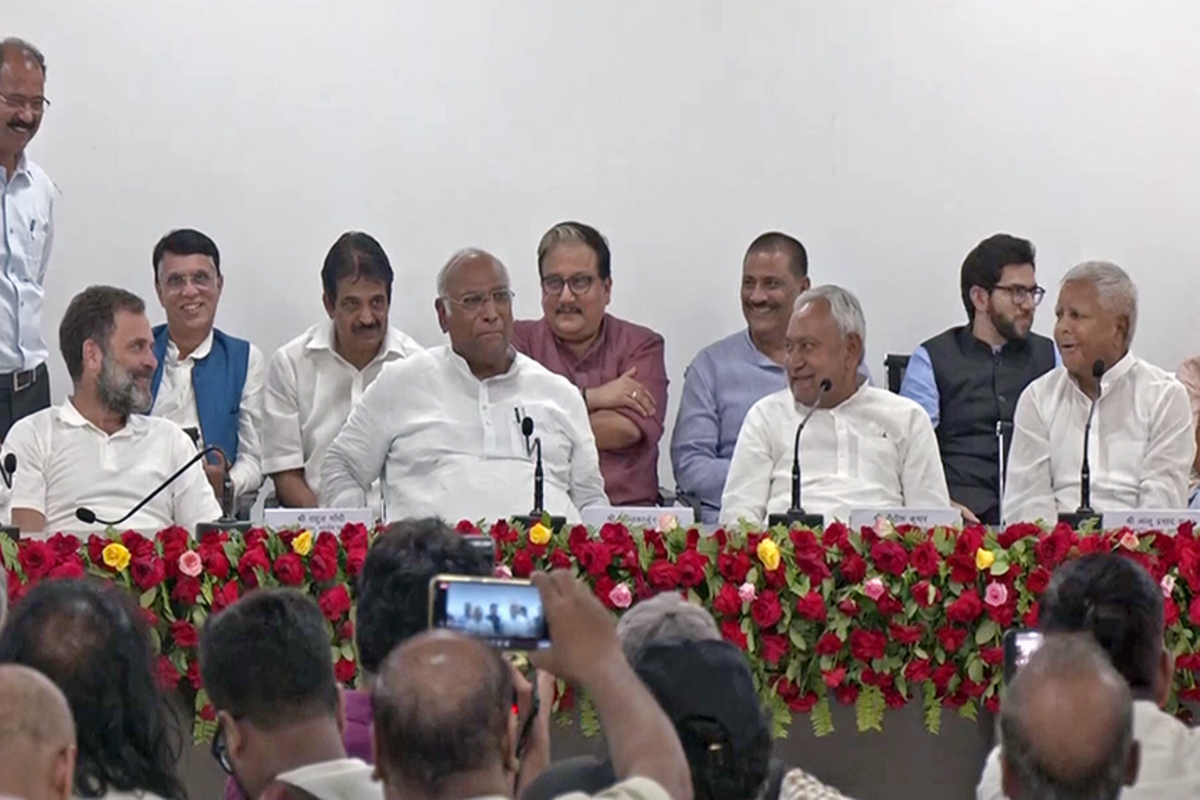PM speaks with Trump, says India, US will work together towards global peace, prosperity, security
This was the first telephonic conversation between both leaders since President Trump took office last week.
The new Opposition coalition, INDIA, has given a notice for a no-confidence motion against the Modi government and the Speaker has admitted it. Earlier this month, 26 opposition parties formed the Indian National Developmental Inclusive Alliance (INDIA).

Bihar CM Nitish Kumar, RJD chief Lalu Prasad Yadav, Congress President Mallikarjun Kharge, party leader Rahul Gandhi (File Photo)
The new Opposition coalition, INDIA, has given a notice for a no-confidence motion against the Modi government and the Speaker has admitted it. Earlier this month, 26 opposition parties formed the Indian National Developmental Inclusive Alliance (INDIA). This will be the 28th no-trust vote since Independence and the second faced by the Modi government. In 2018, a Congress MP brought a motion over the state of Andhra Pradesh, which was given a special category status for tax concessions to attract new investors. The motion was defeated after a 12-hour debate.
The decision to move the motion by the Opposition bloc comes after the current monsoon session of Parliament faced disruption for four consecutive days on the Manipur issue. The fate of the present no-trust motion is already known. The ruling BJP can easily win the motion, as the math favours Modi. The BJP-led NDA has 332 members in Lok Sabha. The required majority mark is 272. The Jagan Mohan Reddy-led Yuvajana Sramika Rythu Congress Party (YSRCP), not a part of the NDA, has decided to back the Modi government. It has 22 members in the Lok Sabha. The opposition ‘INDIA’ bloc has a strength of 142 seats. The KCR-led Bharat Rashtra Samithi (BRS), not part of the INDIA bloc, has backed the Opposition on the no-confidence motion. It has nine members in the Lok Sabha. The BRS also had submitted a no-trust motion separately, but the Speaker did not admit it. The Opposition claims though it will not win the vote, it will win the perception war. The motion will pressure Prime Minister Modi to come before Lok Sabha and answer questions. Modi has largely remained silent for over 80 days.
Advertisement
The ethnic clashes began in early May between the majority Meitei group, who are overwhelmingly Hindu, and the mainly Christian Kuki and Naga tribes in the BJP-ruled state. The clashes have caused widespread national and international anger after some disturbing videos became public recently. A video of two women paraded naked by a mob sparked global outrage last week. A high-ranking member of the Biden administration also expressed condemnation. The face-off between the Government and the Opposition escalated over the issue, resulting in the nonstop disruption of Parliament since the Monsoon session began.
Advertisement
Having a considerable majority, the Modi Government has nothing to fear, yet it refused to be flexible and accommodating towards the Opposition. The Opposition, too, is confronting the Government with unruly scenes. So both sides are to be blamed. While it is the business of the Government to ensure the smooth running of Parliament, the Opposition is expected to provide constructive criticism. Debate, discussion, and constructive criticism are fundamental parts of law-making. Both sides must change their attitude. Modi must deliver a speech in Parliament after facing a no-confidence motion. The Opposition too has to raise their concerns during the no-trust vote debate. The lack of proper debate is weakening Parliament.
It’s essential to recognize the value of parliamentary debates in shaping public opinion and promoting democratic principles. Dismissing these debates as unproductive would be a mistake. Members debate bills before they vote on them. They must raise their concerns on the floor of the House. They could do so during question hour, short notice questions, calling attention motions, adjournment motions and finally, a no-trust motion. Since Independence, Indian Parliament has witnessed several debates.
But over the years, disruptions rather than debate have become the norm. Even the former Chief Justice of India N.V. Ramana lamented that the Parliament did not have adequate debates over scrutinizing the laws. M.P.s from both sides must use debates and discussion to represent their constituents’ views and allow for meaningful discussion of government policies. They must help make necessary adjustments and amendments to a bill so that it can effectively fulfil its purpose. There is a need for an effective Parliament. According to the Constitution, the legislature makes laws, the Government implements them, and the judiciary enforces them.
Immediate and decisive action must be taken to implement necessary reforms and ensure that parliamentary institutions and processes become effective and powerful tools for sustainable growth. The Modi government’s massive majority in the Lok Sabha does not mean it can ensure smooth functioning. The Opposition can be effective only if it finds the correct issues. That does not mean that only walkouts, shouting slogans, and disrupting the House will serve their purpose.
The time has come for political parties to rethink their strategy of obstructing business and consider how to start debating and discussing issues. After all, Parliament is meant for two significant things – budget scrutiny and law-making.
Advertisement